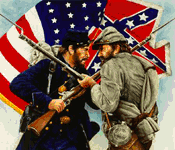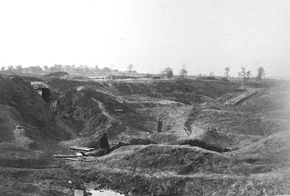 |
Civil War Battles |
|
State War Records |
| AL - AK - AZ - AR - CA - CO - CT - DE - FL - GA - HI - ID - IL - IN - IA - KS - KY - LA - MA - MD - ME - MI - MN - MS - MO - MT - NE - NV - NH - NJ - NM - NY - NC - ND - OH - OK - OR - PA - RI - SC - SD - TN - TX - UT - VT - VA - WA - WV - WI - WY |
The Battle of Mine Run
November 26-Dec 2, 1863 in Orange County, Virginia
aka Payne's Farm, or New Hope Church, or the Mine Run Campaign
 |
|||||||||||||||||||||
|
Payne's Farm and New Hope Church were the first and heaviest clashes of the Mine Run Campaign.
Following the effective Union action at Rappahannock Station on November 7, Maj. Gen. George G. Meade was inactive except for cavalry actions.
On the 26th, he began a manuever calculated to turn Gen. Robert E. Lee's right, which was the nearest and most exposed Confederate flank. The advance was slow, largely due to the tentativeness, even ineptness, of Maj. Gen. William H. French, who commanded the lead corps.
The delay allowed Lee to effect countermoves. When he ascertained that Meade meant to attack his army rather than attempt to cut the Fredericksburg & Richmond Railroad, he could scarcely believe his good fortune. His numerically inferior army would be in a position to fight a defensive action. Thus, on on the 28-29th, he established strong field fortifications along the west bank of Mine Run.
Carr's division attacked twice. Johnson's division counterattacked but was scattered by heavy fire and broken terrain. After dark, Lee withdrew to prepared field fortifications along Mine Run. The next day the Union army closed on the Confederate position. Skirmishing was heavy, but a major attack did not materialize. By the end of the day Lee had spotted an opening on Meade’s left and was preparing a counter-attack. Meade concluded that the Confederate line was too strong to attack and retired during the night of December 1-2, ending the winter campaign.
Lee’s attack was launched at dawn on December 2, but ‘hit the air’ and could only pick through the debris of Union campgrounds.
The Army of the Potomac went into winter quarters at Brandy Station, Virginia. Mine Run had been Meade's final opportunity to plan a strategic offensive prior to the arrival of Ulysses S. Grant as general-in-chief the following spring. Lee also regretted the inconclusive results. He was quoted as saying, "I am too old to command this army. We never should have permitted those people to get away." Confederate hopes of repeating their Chancellorsville triumph had been dashed.
